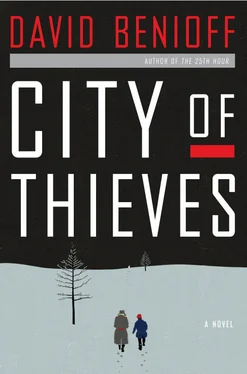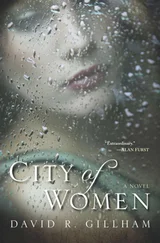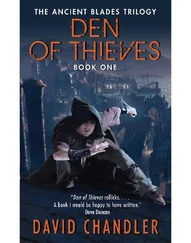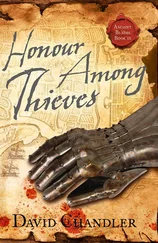Following some unarticulated instinct, I veered off my course to follow the stream, running downhill along the slippery stones, faster now that I was out of the snow. My body waited for the inevitable bullet, the railroad spike hammered between my shoulder blades, slamming me face-first into the cold water. Despite everything, I was strangely nimble, my feet picking their next step without consulting my brain, my boots splashing in icy water, never stumbling.
I don’t know how long I ran or how far, but finally I had to stop. I ducked behind the trunk of an ancient larch, its drooping branches heavy with melting snow, and sat in the shadows trying to breathe. My legs would not stop trembling even after I pressed my mittened hands down on my thighs to calm them. When my lungs stopped hurting, I peered around the trunk and looked uphill.
Three men were coming my way, rifles in hand, jogging at a deliberate rate. None of them wore German uniforms. The closest man wore a ski soldier’s winter whites, and I realized it was the partisan I had seen sucking a dead man’s wedding ring off his finger. Markov, the others had called him. I loved him at that moment, loved his blunted red face, the deep-set eyes that had seemed murderous the night before.
Behind him came Kolya and I laughed aloud at the sight of him. I had met him on Friday night and didn’t even like him until Monday, and now, Tuesday afternoon, seeing him alive made me want to cry with happiness. He had lost his Astrakhan hat during his flight and his blond hair hung over his forehead until he pushed it back. He turned to say something to the man beside him, grinning as he spoke, and I knew he thought he was making a very funny joke.
The man beside him turned out to be Vika. Unlike Kolya, she had held on to her fur cap; it was pulled down to her eyebrows and even from a distance I could see her wolfish blue eyes roving just below the fringe of rabbit fur. Whatever Kolya said did not amuse her. She did not even seem to be listening. She turned every few paces to check for pursuers.
My run could not have lasted very long (twenty minutes? ten?), but the inside of the trapper’s cabin seemed like a memory stolen from a stranger. Real terror—the genuine belief that your life is about to end violently—erases everything but itself from the brain. So even after I saw Kolya and Vika and Markov, even though their three faces seemed to me the most beautiful faces in all of Russia, I wasn’t able to call their names or wave my hand. The shadow beneath the sagging arms of the larch tree was my safe place. Nothing evil had happened to me since I got there. The Germans had not found me. I hadn’t seen anyone’s jawbone blasted off his face, leaving nothing but puzzled eyes over slop from a butcher shop’s floor. I could not beckon to Kolya, even though in four days he had become my best friend.
Maybe I shifted my position slightly or shivered—I must have made some slight noise because Vika swiveled toward me, the stock of her rifle pressed against her shoulder, the muzzle pointed at my head. Even then I wasn’t able to speak quickly enough to save my life. I could have cried out her name. Any Russian sentence might have helped.
But somehow, though I sat in deep shade, obstructed from view by snow-covered branches, Vika recognized my face and stayed her trigger finger.
“It’s your little friend,” she told Kolya. “Maybe he’s wounded.”
Kolya ran over to me, pushing aside the larch branches, seizing the lapels of my greatcoat and tilting my whole body left and then right, searching for bullet holes.
“Are you hurt?”
I shook my head.
“Come on, then.” He lifted me to my feet. “They’re not far behind.”
“It’s too late,” said Vika. She and Markov had joined us in the cloistered shadows and she gestured uphill with the barrel of her rifle.
Germans in white anoraks had crested the hilltop, less than two hundred meters away, rifles at the ready, advancing cautiously as they scouted the terrain for ambush sites. Only a few soldiers at first, picking their way through the snow, but more and more came bobbing over the rise, until the hillside above swarmed with men who wanted to kill us.
Markov pulled a pair of field glasses from a pocket in his coveralls. He watched the advance scouts descending the hill.
“First Gebirgsjäger Division,” he whispered, offering the field glasses to Vika. “You see the edelweiss insignia?”
She nodded, waving away the glasses. Between the lines of uniformed soldiers marched a herd of prisoners, their heads down. Red Army men, their uniforms filthy, trudged alongside stunned civilians, who wore whatever they had managed to grab when the Germans raided their villages. Some poor souls marched in their shirtsleeves, without coats or gloves or hats. They sloshed through the snow, never looking up or saying a word, heading directly for us.
“Looks like a whole company coming this way,” said Markov, pocketing the field glasses and readying his rifle. “Figures it happens now, when I’ve got a pocketful of gold.”
Vika put a hand on Markov’s arm. “You’re so quick to be a martyr?”
He glanced at her, the steel sights of his rifle already lined up on the closest Nazi.
“Shooting infantry,” she said, “that’s nothing. We’re after Einsatz.”
He scowled and pushed away her hand as if she were a crazy woman on the street who had come begging for money.
“We don’t get to choose. All I see is mountain rangers.”
“Einsatzgruppe A travels with the First Gebirgsjäger. You know that. Abendroth has to be close.”
Kolya and I glanced at each other. Last night we had heard the name Abendroth for the first time; the syllables were already edged with dread. I could not expel the mental image of Zoya writhing on the floor beside her severed feet. The man himself I could not picture, the girls had not described him, but I imagined his hands— freckled with blood, the nails filed and immaculate—as he rested the saw on the wood floor of the farmhouse.
“It’s over,” said Markov. “No more running.”
“I never said anything about running. They’ve got more than a hundred prisoners. We mix in with them—”
“Have you gone soft, you silly cunt? You think you walk out there with your rifle in the air, Fritz will let you surrender?”
“We’re not surrendering.” She wrapped one gloved hand around a low-hanging branch, pulled herself up, and wedged her rifle into the gap between trunk and branch. Lowering herself to the ground, she slapped the snow from her gloves and motioned for Markov to hide his rifle, too.
“We’re going to mix in with the prisoners and wait for the right moment. They’ve already searched those sheep for weapons. You’ve got a pistol on you somewhere, don’t you? Come on, hurry. Get rid of the rifle.”
“They might search them again.”
“They won’t.”
The closest Germans were less than one hundred meters away, their hoods cinched tight over their field caps. Markov stared at them, their pink faces easy targets for a skilled marksman.
“They’ll kill half those prisoners by nightfall.”
“So we’ll be in the other half.”
Kolya smiled and nodded, warming up to the idea. It was the kind of ludicrous scheme he might have devised himself and it didn’t surprise me he was pleased with it.
“It’s worth trying,” he whispered. “If we get in with the rest of them, there’s still a chance. And if they spot us, all right, we’ll have our shoot-out then. It’s a good plan.”
“It’s a horseshit plan,” said Markov. “How are we going to get in there without them seeing us?”
“You still have a few grenades, don’t you?” asked Vika.
Markov stared at her. He looked like the kind of man who had been punched in the face many times, his nose flat as a boxer’s, half his teeth missing from the lower row. Finally, he shook his head, strapped his rifle to the hilt of a broken branch, and peered out at the approaching column.
Читать дальше












